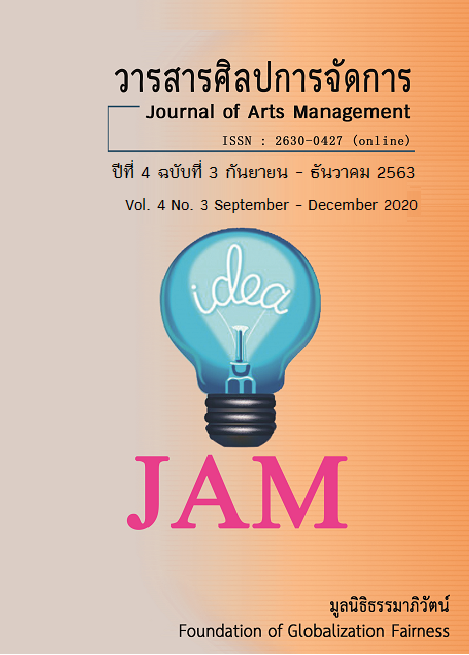The Roles of Village Headman of the Futue Headman
Main Article Content
Abstract
The purposes of this study were (1) to study the factors influencing the desirable roles of local leaders in the future; and (2) to study the problems and obstacles pertaining to the desirable roles of local leaders. The sample was local leaders and other local government leaders. The instrument used was a purposive sampling technique. The instrument for collecting data was in-depth interviews. Analysis data were descriptive statistics and content analysis.
The research results were found that the factors influencing the desirable roles of local leaders in the future will be 1) the factor concerns about the local leaders’ educational degree; 2) the respect to the governance and the law and order. The local leaders should have the ability to protect people’s lives and assets. The local leaders should also play a leading role in the promotion and development of occupations of the locals; and 3) in the role of environmental duty, local leaders should be responsible for the promotion and support the locals to take care of canals, rivers, forests and other natural resources. Also, they must strongly adhere to the strict discipline, the perseverance, dedication, devotion, and they must conduct their official business using the principle of good governance.
The results of this research were found that the factors influencing the desirable roles of local leaders in the future will be education, knowledge and ability, governance and the law and order, promotion and development of occupations of the locals, as well as promote and support the locals to take care of canals, rivers, forests and other natural resources, and prevention of disaster.
Article Details
Views and opinions appearing in articles in the Journal of Arts of Management It is the responsibility of the author of the article. and does not constitute the view and responsibility of the editorial team I agree that the article is copyright of the Arts and Management Journal.
References
ไททัศน์ มาลา. (2559). การคงอยู่ของกำนันผู้ใหญ่บ้านในบริบทของการกระจายอำนาจสู่ท้องถิ่น: กรณีศึกษา จังหวัดปทุมธานีและจังหวัดพระนครศรีอยุธยา. วารสารวิจัยและพัฒนาวไลยอลงกรณ์ในพระบรมราชูปถัมภ์ สาขามนุษยศาสตร์และสังคมศาสตร์, 11(1), 305-317.
บงกชมาศ เอกเอี่ยม. (2557). กํานัน-ผู้ใหญ่บ้าน: บทบาทและภาวะความเป็นผู้นํากับความคาดหวังของประชาชนที่มีต่อผู้นําชุมชนท้องถิ่นในจังหวัดเชียงใหม่. การประชุมวิชาการ การพัฒนาชนบทที่ยั่งยืน ครั้งที่ 4 ประจำปี 2557 วันที่ 11-13 มิถุนายน 2557. วิทยาลัยบริหารศาสตร์ มหาวิทยาลัยแม่โจ้ อำเภอสันทราย จังหวัดเชียงใหม่.
พรชัย เทพปัญญา. (2560). การพัฒนาศักยภาพและเพิ่มประสิทธิภาพการปฏิบัติหน้าที่กำนันผู้ใหญ่บ้าน. วารสารวิทยาการจัดการ มหาวิทยาลัยราชภัฏเชียงราย, 12(2), 181-202.
ราชกิจจานุเบกษา. (2551). พระราชบัญญัติลักษณะปกครองท้องที่ (ฉบับที่ 11) พ.ศ. 2551. เล่ม 125 ตอน 27 ก, 96-125. 5 กุมภาพันธ์ 2551.
วัชรพงษ์ หนูชัย และคณะ. (2558). การศึกษาเปรียบเทียบบทบาทของผู้ใหญ่บ้านในพื้นที่เทศบาลเมืองต้นเปากับประธานชุมชนในพื้นที่เทศบาลเมืองแม่โจ้. วารสารสหวิทยาการวิจัย: ฉบับบัณฑิตศึกษา, 4(3), 85-95.
สุภางค์ จันทวานิช. (2553). วิธีการวิจัยเชิงคุณภาพ. (พิมพ์ครั้งที่ 18). กรุงเทพฯ: สํานักพิมพ์แห่งจุฬาลงกรณ์มหาวิทยาลัย.
อนุวัตร กองพันธุ์. (2560). บทบาททางการเมืองของกำนันและผู้ใหญ่บ้าน ในเขตอำเภอเมือง จังหวัดปทุมธานี. (ปริญญารัฐศาสตรมหาบัณฑิต). มหาวิทยาลัยรังสิต.
Miles, M. B., & Huberman, A. M. (1994). Qualitative Data Analysis: An Expanded Source Book. (2nd ed.). Thousand Oaks, CA: Sage.


